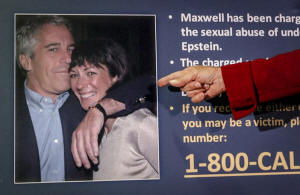Judge rejects Trump administration effort to unseal Epstein grand jury
records in Florida
[July 24, 2025]
By ED WHITE
A judge on Wednesday rejected a Trump administration request to unseal
transcripts from grand jury investigations of Jeffrey Epstein years ago
in Florida, though a similar request for the work of a different grand
jury is pending in New York.
U.S. District Judge Robin Rosenberg in West Palm Beach said the request
to release grand jury documents from 2005 and 2007 did not meet any of
the extraordinary exceptions under federal law that could make them
public.
The Justice Department last week asked the judge to release records to
quell a storm among supporters of President Donald Trump who believe
there was a conspiracy to protect Epstein’s clients, conceal videos of
crimes being committed and other evidence.
In 2008, Epstein cut a deal with federal prosecutors in Florida that
allowed him to escape more severe federal charges and instead plead
guilty to state charges of procuring a person under 18 for prostitution
and solicitation of prostitution.
Deputy Attorney General Todd Blanche had asked judges in Florida and New
York to unseal transcripts from grand jury proceedings that resulted in
indictments against Epstein and former girlfriend Ghislaine Maxwell,
saying “transparency to the American public is of the utmost importance
to this Administration.”
Federal grand juries hear evidence in secret and then decide whether
there is enough for an indictment. Experts say the transcripts likely
would not reveal much because prosecutors typically are trying only to
present enough material to get charges and don't introduce the entire
investigation.
Epstein, a wealthy financier, years later was arrested in 2019 on
federal sex trafficking charges, while Maxwell was charged with helping
him abuse teenage girls.
Epstein was found dead in his cell at a federal jail in New York City
about a month after he was arrested. Investigators concluded he killed
himself. Maxwell later was convicted at trial and sentenced to 20 years
in prison.
[to top of second column]
|

Audrey Strauss, acting U.S. attorney for the Southern District of
New York, points to a photo of Jeffrey Epstein and Ghislaine
Maxwell, during a news conference in New York on July 2, 2020. (AP
Photo/John Minchillo, File)

The case attracted attention because of Epstein and Maxwell’s links
to famous people, including royals, presidents and billionaires. It
also led to some of the biggest conspiracy theories animating
Trump’s base.
The furor over records has been stoked by the Justice Department. In
February, far-right influencers were invited to the White House and
provided with binders marked “The Epstein Files: Phase 1” and
“Declassified.” The binders contained documents that had largely
already been in the public domain.
The department on July 7 acknowledged that Epstein did not have a
list of clients. It also said no more files related to his case
would be made public.
A two-page memo that bore the logos of the FBI and Justice
Department, but that was not signed by any individual, said the
department determined that no “further disclosure would be
appropriate or warranted.”
Meanwhile, a House Oversight subcommittee voted Wednesday to
subpoena the Justice Department for files. The full committee issued
a subpoena for Maxwell to testify before committee officials in
August. And Sen. Adam Schiff, D-Calif., called on Attorney General
Pam Bondi and FBI Director Kash Patel to appear before the Senate
Judiciary Committee.
All contents © copyright 2025 Associated Press. All rights reserved |